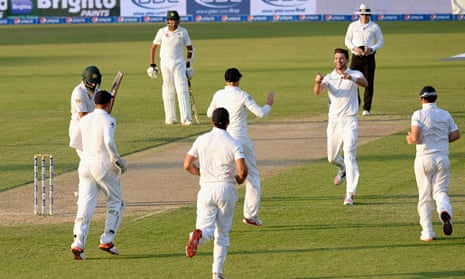The England bowlers toiled manfully in the Sharjah heat. At one time Jimmy Anderson and Stuart Broad had such a tight hold on the Pakistan batsmen they threatened to strangle the life out of the innings. They were already thinking about the second new ball by the time Broad, a metronome, conceded his second run of the day and kicked the turf in frustration. But by the end of the day, after Misbah-ul-Haq, who made 71, had threatened to take the game away, England had fought back ferociously to leave the first day even.
The pitch, a relaid strip and very much an unknown quantity, offered little in the way of pace, so that timing was an elusive thing, but from the morning session began to turn for the England spinners, four of them in the match if Joe Root is to be counted. The trio who did bowl, first Samit Patel, on his unexpected return to the side, Moeen Ali and Adil Rashid, could provide neither the control that the seamers had managed (although Patel found a nice rhythm during the afternoon when England enjoyed their best session) nor the cutting edge that the spin might have provided. Anderson and Broad were simply outstanding, though, as they have been all series, hammering away relentlessly on a length, offering nothing either to drive or to cut and pull, all to an immaculate line. It was textbook seam bowling in difficult conditions, based on patience and skill.
It was therefore fitting that they reaped the rewards. Somehow Broad had managed only two wickets in the first two Tests but took two more here, while Anderson chipped away, taking one with the first new ball, Misbah, two with the second and one, Younis Khan, in between. Anderson finished with four for 17 and Broad two for 13, combined figures then of 28.1-15-30-6. England were left with two overs to bat and Moeen opened the account by belting the penultimate ball of the day over the midwicket boundary almost for six.
Worryingly for England and perhaps not just in the short term, they are now a bowler and batsman down. It was midway through the final session, when the Pakistan wicketkeeper Sarfraz Ahmed swept a full toss from Patel to square-leg where Ben Stokes, a magnificent fielder, flung himself to his left and almost brought off a spectacular one-handed catch.
In doing so he landed heavily on his right shoulder, the ball jolting from his grasp, and his shoulder, dislocated perhaps, leaving the player writhing in pain. After some lengthy treatment he was led from the field, with his right arm in a sling devised from his shirt.
His participation in the rest of the tour must be in doubt and, if indeed his shoulder has dislocated, maybe that in South Africa too, certainly as an all-rounder. Dislocations of that kind have had long-term effects, certainly reducing the pace of Jeff Thomson to merely terrifying, and, for example, going some way to ending the international career of Adam Hollioake. Shane Warne, on the other hand, managed to get fit again in a month before the 2003 World Cup.
Alastair Cook lost the toss, of course he did, and Misbah, just as he did in Dubai, first looked apologetic and then informed Cook he would like to bat first. Too often, the loss of the toss proves to be more mental than anything: bowlers grumble about having to go in the field; players feel they are up against it already. But it does not always work out for the worse.
Although pitches which turn from the start often do not actually get worse, and sometimes become easier, this is one on which batting last, against a spinner as accomplished as Yasir Shah, will be a trial. So, well as England bowled, Pakistan, all out for 234, a small total on the face of it, and finished off by the second new ball, know that in Yasir and Zulfiqar Babar they have the spin capacity to make life difficult and, with a surface that is abrasive with a less lush outfield, conditions to help Wahab Riaz reverse the ball at high pace.
At one time, midway through the afternoon, when Patel, bowling nicely, found the edge of Asad Shafiq’s bat after the batsman had been tied down for too long, Pakistan were 116 for five. What followed, though, was the defining partnership of the innings, between Misbah and the bristling wicketkeeper Sarfraz who, while Misbah continued his way of seemingly idling along before breaking out with bouts of violence, began a counterattack against the spinners. Together the pair added 80 before Sarfraz, with the new ball imminent, clobbered Moeen to deep midwicket, which left his captain shaking his head at the profligacy of it at such a time.
Misbah remains an enigma, who blocks the seamers with a religious fervour and belts the spinners with abandon, so that in this series he averages 10 times as many against spin as he does seam. He does know what he is doing, though, taking risks where appropriate, attempting in particular to unsettle Rashid, and held the innings together until he edged Anderson tamely to second slip.

Comments (…)
Sign in or create your Guardian account to join the discussion